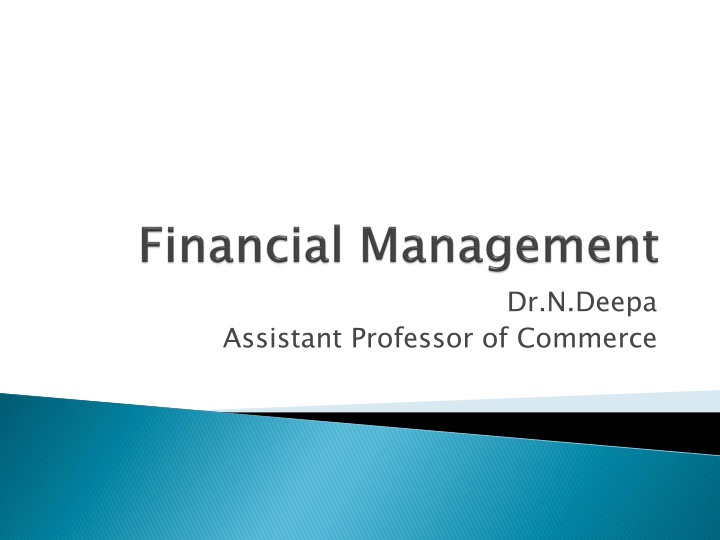
Financial Management in Commerce: Key Concepts and Strategies
Explore the world of financial management in commerce, covering topics such as the meaning, scope, and objectives of financial management, cost of capital, leverage, dividend theories, working capital management, and sources of finance. Learn about important financial decisions, capital budgeting techniques, determinants of capital structure, and the process of administering and controlling organizational affairs to achieve goals.
Download Presentation

Please find below an Image/Link to download the presentation.
The content on the website is provided AS IS for your information and personal use only. It may not be sold, licensed, or shared on other websites without obtaining consent from the author. If you encounter any issues during the download, it is possible that the publisher has removed the file from their server.
You are allowed to download the files provided on this website for personal or commercial use, subject to the condition that they are used lawfully. All files are the property of their respective owners.
The content on the website is provided AS IS for your information and personal use only. It may not be sold, licensed, or shared on other websites without obtaining consent from the author.
E N D
Presentation Transcript
Dr.N.Deepa Assistant Professor of Commerce
UNIT Financial Management - Meaning, Nature, scope and objectives Role and functions of Financial Management Financial decisions relationship between Risk and Return Sources of finance Short-term and Long-term finance. UNIT Cost of Capital - Meaning and importance Cost of Debt, Preference, Equity and Retained Earnings Weighted Average Cost of capital Capital budgeting Techniques ROI, Payback period and Discounted cash flow. UNIT Leverages - Financial Leverage Operating leverage EBIT and EPS analysis Theories of Capital Structure Net income approach Net operating income Approach. MM Hypothesis Determinants of capital structure- Capitalisation Over and Under Capitalisation-Merits and Demerits. UNIT Leasing - Nature and Types- Advantages and Disadvantages-Dividend Theories: Walter s model Gordon and MM s models Dividend policy - Forms of Dividend Determinants of dividend policy. UNIT Working Capital Management Cash Management Receivables Management Inventory Management Determinants and Computation of Working Capital. Note: Question paper shall cover 60% Theory and 40% Problems UNIT I I UNIT II II UNIT III III UNIT IV IV UNIT V V
What is Finance? FINANCE This is money What is Finance?
Individual Planning Individual Planning
Company Planning Company Planning
Different sources of finance have different business, so it is important that the most appropriate method of finance is chosen for the purpose that the business has in mind implications for a
Process of administering and controlling the affairs of the organisation to achieve the goal effectively and efficiently Functions planning, organising, staffing, directing and controlling Coordination integrating all activities, processes and operations to ensure its success
It means planning, organising and controlling the financial activities (procurement and utilisation) Definition Financial concerned controlling in Financial management concerned controlling and in the management is is the with and administering the business the activity raising, of funds and Dougal activity raising, funds used Dougal with administering of business. . Guthman planning, planning, used Guthman and
